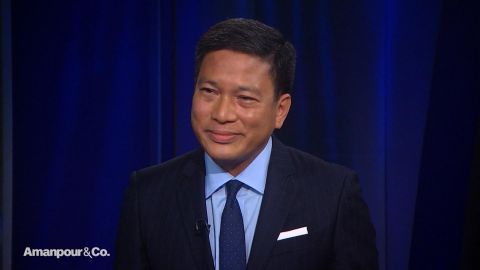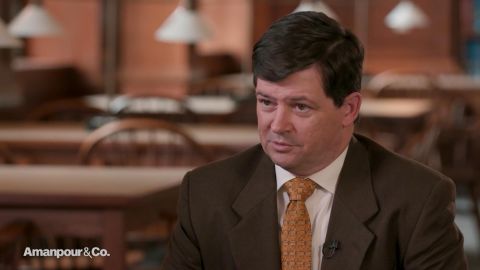Read Transcript EXPAND
CHRISTIANE AMANPOUR: OK. So I saw “Greed,” and it’s one letter away from green, i.e., Philip Green, the famous High Street rag merchant gone bust, et cetera. Is this about Philip Green, Stephen Coogan?
STEVE COOGAN, ACTOR: I think — well, Philip Green certainly was an inspiration for it. And a lot of the lines in the film are listed straight his mouth. But it’s not — it would be wrong to single him out as sort of the target of the film. There are many, many sort of perpetrators of this sort of exploitive behavior. And Philip Green happens to be the most theatrical of them. And, in some ways, I probably owe him a debt, because he’s unambiguous and unapologetic about his world view and the way he operates. And that helps us in terms — it certainly helped us in terms of making the film.
AMANPOUR: So, Michael Winterbottom, let me ask you to fill out at least the premise of the story for our viewers, because not many maybe in America or around the world will know Philip Green, although he, among other things, owned Topshop. It’s a very well-known global brand. Kate Moss was the face of it for a long, long time. So, perhaps people will know that. But just give us the premise of the film.
MICHAEL WINTERBOTTOM, DIRECTOR, “GREED”: Well, the film is a fiction. It’s about a guy called Sir Rich McCreadie that Steve plays, who is a kind of retail fashion tycoon. He’s had a huge amount of success. He’s a billionaire. Then one of his brands goes bankrupt. And so there’s a lot of inquiries into his kind of business practices, so he decides to throw a big, lavish party on a Mediterranean island, on a Greek island, a Roman-themed party, to sort of reestablish his sort of like king of the High Street credentials. And, fortunately, everything goes wrong.
AMANPOUR: Well, it goes wrong spectacularly. Well, first and foremost, I was stunned to actually read that the budget for the whole film, “Greed,” was less than the real-life budget, apparently, of Philip Green’s 60th birthday. Is that right?
WINTERBOTTOM: I think that’s right. I mean, obviously, billionaires spend a lot on their parties. They have party organizers spending years planning them. They get all of the A-list celebrities to go to them. They get famous people to put to perform and entertain them. And that’s kind of one of the elements of the film. The idea is that — especially retail fashion, celebrities and famous people are used to make clothes look glamorous. When you walk into your local High Streets, you see Kylie Minogue or Kate Moss or Beyonce on big billboards. And when you buy the dress or the T-shirt, you think you get a little bit of that glamour, a little bit of that empowerment. But really what you’re getting is something made by someone in Sri Lanka or Myanmar or Bangladesh, working for very, very low wages. And perhaps if you saw the image of the women making your clothes when you went into the shops, you would feel slightly different about them.
About This Episode EXPAND
Author Thant Myint-U explains the hidden history of Burma. Actor Steve Coogan and director Michael Winterbottom discuss fast fashion and the new film “Greed.” Journalist Jeremy Wallace sits down with Walter Isaacson to break down the issues that are important to Texas voters going into Super Tuesday.
LEARN MORE


